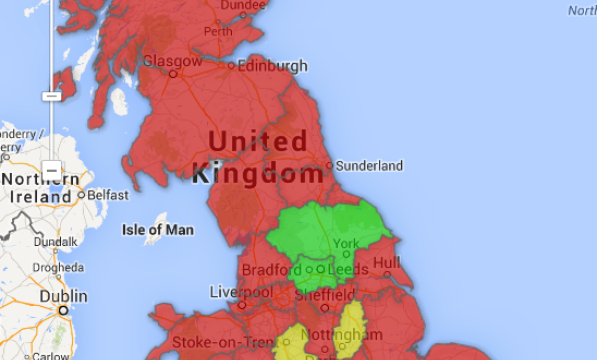Road Justice reveals which police forces are committed to road safety for cyclists

The map shows that over a third of forces in England and Wales support at least one of the campaign’s recommendations for improved roads policing.
The recommendations, contained in a report published for the Road Justice campaign in July, focus on three areas of roads policing that need to be addressed and improved, they are: road collision investigations; resources and training; and victim support. The Road Justice campaign will publish a report looking specifically at the Scottish justice system’s handling of road collisions in 2014, which will be delivered to Police Scotland.
Since the report was received by every police force in England and Wales, the Road Justice campaign coordinator, Rhia Weston, has spoken with several senior police officers and collision investigators, some of whom have invited CTC to work with them on enhancing the police’s ability to promote cycle safety and safe driving.
For the most part, the police have been keen and willing to discuss the report, in order to explain the constraints they are under, mostly as a result of resource cuts, and to discuss the changes they’d like to be made to roads policing.
Rhia Weston
Road Justice Coordinator
Responses to recommendations
Several forces including City of London, North Yorkshire and Suffolk, said they would welcome additional funding for roads policing. City of London police specifically bemoaned the lack of national targets for road crime reduction as the reason why roads policing gets side-lined in budgets.
Gwent and North Yorkshire agreed that better training is required for non-specialist police officers who handle minor collisions and Gloucestershire and Thames Valley said they would look into online collision reporting systems. Almost all forces that responded agreed that officers should guard against the propensity to blame road crash victims and that all crash victims should be included in the Code of Practice for Victims of Crime.
Devon and Cornwall - who CTC singled out in the campaign report for completely slashing roads policing in 2011 – have announced that they will create a safer roads support unit with 150 staff and review their roads policing training. Forces that have not responded yet include Cumbria, Lancashire, Lincolnshire, Northamptonshire, and Avon and Somerset.
How to use the map
The map uses a traffic light system to show how forces have responded to the Road Justice report. Green means a force agrees with many of the recommendations; amber means a force agrees with at least one of the recommendations; and red means either the force has not yet responded or disagrees with all the recommendations.
Clicking on a force area on the map brings up a window containing a force’s more detailed response as well as local roads policing statistics, such as roads police officers as a percentage of the whole police force and how many road casualties on average there are per year for each roads police officer. Take a look at the map to see how your local police force has responded.
The Road Justice petition
Nearly 10,000 people have signed the Road Justice petition calling for improvements to roads policing in order to make cycling safer. So far, Surrey is the area with the greatest number of signatures in proportion to population, followed by Avon and Somerset and North Yorkshire. At the bottom of the ranking are Humberside, Cleveland and Gwent.
The campaign is seeking a meeting with the Minister for Policing, Criminal Justice and Victims, Damian Green MP, to deliver the petition. Please add your name to the petition.


